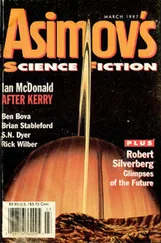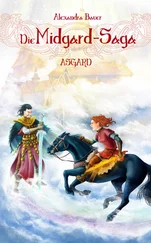Asgard’s Heart
by Brian Stableford
I did not set out on life’s great journey with the intention of becoming a demigod. Indeed, when I was a boy growing up on Microworld Achilles in the asteroid belt, it had never occurred to me that such a career choice was possible.
Had I known then what destiny had in mind for me, I might have stayed home and spared myself a great many hazards—an exciting life was not something that I particularly craved. On the other hand, now I know how incomprehensively vast the Great Scheme of Things really is, and how very difficult it is for a single individual to amount to anything within that Scheme, I cannot help but feel a certain sense of privilege in having become what I am.
I claim no great credit for the fact that out of all the billions of people who happened to be within Asgard at the critical moment of its history, fate selected me for the crucial role; I was desperately unlucky to be saddled with the responsibility, and fantastically fortunate not to make a mess of things. But the impossible had to be done, and circumstance determined that I was the one who had to do it.
On two occasions in the past I have found it convenient to commit parts of my story to tape, and those earlier slices of autobiography must still exist somewhere in the universe, though I am not sure that it will ever be possible to assemble them in one place to form an eccentric trilogy. I will be brief in summarising the events described therein.
In the first of those accounts I described how my attempts to scrape a living as a scavenger, recovering technological artefacts from the topmost levels of Asgard, were suddenly complicated when my fellow human Saul Lyndrach discovered a shaft which gave access to more than a hundred levels which had never been breached by any member of the galactic community. Saul was prevented from enjoying the fruits of his discovery because he was murdered by some of the more barbaric members of the community, headed by the loathsome Amara Guur, but they in turn were frustrated by their inability to read French, the language in which Saul had kept his notes.
It so happens that I am of French-Canadian descent, and it transpired that I was the one man on Asgard who could read Saul’s notes, so the gangsters who had stolen them set out to entrap me. As things turned out, however, I was not delivered into the hands of my enemies, but into the hands of Earth’s glorious Star Force, who had a very different reason for wanting to locate Saul’s dropshaft. What they wanted was to hunt down and kill an android who called himself Myrlin, who had been manufactured for nefarious reasons by the Salamandrans, lately defeated by humankind in a minor interstellar war.
Suffice it to say that our expedition into the lower depths of Asgard culminated in an orgy of murder and mayhem, carefully observed by the technologically-sophisticated inhabitants of a level deep inside the centre of the macroworld. Confused by the discovery that the universe was much vaster than they had previously imagined, and rather different in kind, these super-scientific machine-intelligences then elected to seal themselves off from further contact with the galactic community.
In the second chronicle of my adventures I described how turmoil erupted in and around Asgard when the galactic community’s base there was overrun by barbarian invaders from the lower levels, and how the leading citizens of the galactic community, the Tetrax, who were led by the fact that these invaders closely resembled human beings, recruited humans to help them in trying to find a solution to their diplomatic difficulties. Naturally, the double-dealing for which the Tetrax are justly notorious precipitated the helpful humans in question—including me—into very deep trouble. This, however, was only a prelude to the development of much greater problems deeper inside Asgard.
My eventual return to the level inhabited by the machine-intelligences—who called themselves the Isthomi (or, not being very numerous, the Nine)—discovered matters in extreme disorder. Awakened to a new awareness of the mysteries of the universe, the Isthomi had set out to explore the structure of Asgard, trying to make contact with the similar intelligences that they assumed to be running the show. Alas, they suffered considerable injury as a result of the attempt, discovering only the sad truth that if Asgard had ever had great and godlike machine-minds presiding over its vast inner spaces, those minds were either dangerously mad, or embroiled in some kind of conflict whose nature mere humanoids could hardly begin to comprehend.
The war that was raging through the upper levels unfortunately extended its baleful influence to the world of the incapacitated Isthomi, and the reckless stupidity of the warriors in question resulted in my being forced to interface with the machine-mind while a second contact with intelligences closer to the centre was taking place.
After sharing in that moment of contact—and hearing, I thought, an enigmatic cry for help—I was not quite the man I had been before. My mind had not merely been disturbed, but altered in some as-yet-unfathomable way. To say that I was resentful about this invasion of my innermost privacy would have been understating the case, but there was no going back. I knew that I would have to play my part in the interesting times that had suddenly returned to the lower depths of Asgard, no matter what that part might be.
It turned out to be a more vital and more peculiar part than I could ever have imagined.
It began, I suppose, with the haunting.
I had become used to “ghosts” of a certain kind. Following their near-destruction, the Isthomi had found great difficulty in arranging any kind of manifestation of themselves that would present to their humanoid guests a reassuring appearance. Their attempts to produce the appearance of a human face with which to address me had resulted only in blurred images etched in white light upon the night-black walls of their realm: images I could not help but think of as ghosts. But those ghosts differed from the one that later came to haunt me in two very vital respects. Firstly, they were in and of the walls of the worldlet; they inhabited the “body” of the Isthomi. Secondly, their appearance, however confusing or disturbing it may have been at first, was not in any way threatening.
The new ghost seemed very different—and it frightened me very badly.
I had been having a nightmare—one of many which had troubled me since my forced contact with the denizens of Asgard’s software space. I can remember certain fleeting details of it: a falcon fluttering helplessly because its leg was caught in the jaws of a trap; a sphinx padding softly across the sands of a great desert, following a guiding star; dark gods and fearsome titans taking formation for some awesome, awful battle. All of these things seemed to my dreaming consciousness to be direly prophetic of chaos to come, of a destruction and devastation which would consume both the universe in which I existed and the private universe which was within my mind.
The memory of a dozen other dreams of like kind was still in my mind as I awoke. I remember being quite certain in my mind that I was awake, and that was why I was so very surprised and frightened when I opened my eyes and saw the ghostly entity that was hovering over my bed.
The room in which I was lodged had no windows, but its internal lighting did not fade to pitch-darkness. The artificial bioluminescence of the ceiling retained a glimmer, reminiscent of starlight, even while I slept. Because of that faint radiance, it was not easy at first to see the apparition, whose own glow was very little brighter. It became obvious neither because of its brightness nor its shape—which was not very well focused—but because it was shimmering slightly, like a shifting haze.
Читать дальше












